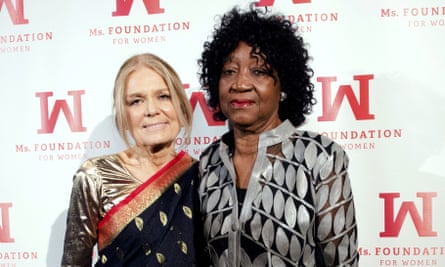The pioneering Black feminist Dorothy Pitman Hughes, a community activist who co-founded Ms magazine with Gloria Steinem and appeared with her in one of the most iconic photos of the second-wave feminist movement, has died. She was 84.
Hughes died on 1 December in Tampa, Florida, at the home of her daughter and son-in-law, according to funeral director Maurice Sconiers. Her daughter, Delethia Ridley Malmsten, said the cause was old age.
Hughes and Steinem forged a powerful speaking partnership in the early 1970s, touring the country at a time when feminism was seen as predominantly white and middle class. Steinem credited Hughes with helping her become comfortable speaking in public.
In one of the most famous images of the era, taken in October 1971 and now displayed in Washington DC’s National Portrait Gallery, the two raised their right arms in the Black Power salute. Played by the singer and actor Janelle Monáe, Hughes featured in The Glorias, the 2020 film about Steinem.

Born Dorothy Jean Ridley on 2 October 1938, in Lumpkin, Georgia, Hughes organized New York City’s first shelter for battered women. She also co-founded the New York City Agency for Child Development to broaden childcare services in the city.
When she was 10, her father was nearly beaten to death and left on the family’s doorstep. The family believed white supremacists with the Ku Klux Klan attacked him.
She moved to New York City in the late 1950s and worked as a salesperson, nightclub singer and house cleaner. By the 1960s she had become involved in the civil rights movement, working with Martin Luther King Jr and Malcolm X.
She set up the West 80th St Community Childcare Center, where in 1968 she met Steinem, who was then a journalist writing a story for New York Magazine. They became friends and from 1969 to 1973 spoke across the country on gender and race issues. In 1972, they co-founded Ms, whose first issue featured Wonder Woman on its cover.

Malmsten said her mother’s biggest contribution was helping entire families through the community centre: “She took families off the street and gave them jobs.”
By the 1980s, Hughes was becoming an entrepreneur. She had moved to Harlem and opened an office supply business, Harlem Office Supply, the rare stationery store at the time that was run by a Black woman. But she was forced to sell the store when a Staples opened nearby, part of the Bill Clinton White House’s Upper Manhattan Empowerment Zone program.
Hughes in 2000 detailed her life experience in a book titled Wake Up and Smell the Dollars! Whose Inner-City Is This Anyway!: One Woman’s Struggle Against Sexism, Classism, Racism, Gentrification, and the Empowerment Zone.
In Ms, Laura L Lovett, whose biography of Hughes, With Her Fist Raised, came out last year, said Hughes “defined herself as a feminist, but rooted her feminism in her experience and in more fundamental needs for safety, food, shelter and child care”.
Lovett wrote, “Dorothy’s style was to call out the racism she saw in the white women’s movement. She frequently took to the stage to articulate the way in which white women’s privilege oppressed Black women but also offered her friendship with Gloria as proof this obstacle could be overcome.”
In the Washington Post last year, Lovett wrote: “She realized that child-care challenges were deeply entangled with issues of racial discrimination, poverty, drug use, substandard housing, welfare hotels, job training and even the Vietnam War.”
In an email to Politico, Steinem paid tribute to Hughes’s legacy, saying, “My friend Dorothy Pitman Hughes ran a pioneering neighborhood childcare center on the west side of Manhattan. … We met in the seventies when I wrote about that childcare center, and we became speaking partners and lifetime friends. She will be missed, but if we keep telling her story, she will keep inspiring us all.”
She is survived by three daughters: Malmsten, Patrice Quinn and Angela Hughes.
